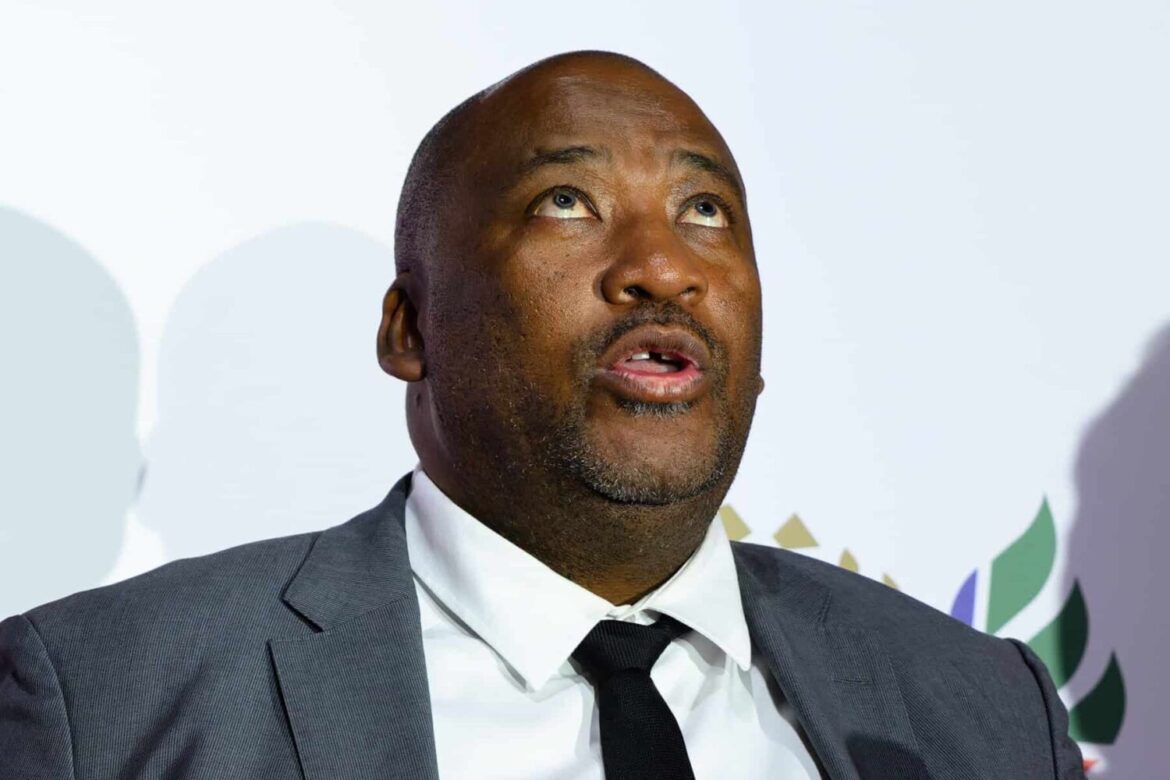The issue of trapped illegal miners in Stilfontein, North West, has sparked intense debate in South Africa, particularly following remarks made by Khumbudzo Ntshavheni, the Minister in the Presidency, who stated that the government would not rescue the miners, calling them “criminals” and insisting that they would be “smoked out.” This stance has drawn widespread reactions, with some supporting the government’s tough approach, while others, including prominent figures such as Helen Zille and Gayton McKenzie, have voiced differing views.
In a media briefing earlier this week, Ntshavheni made it clear that the government would not assist the miners trapped underground, labeling them criminals. She said, “We are not sending help to criminals. We are going to smoke them out. They will come out. We are not sending help to criminals. Criminals are not to be helped. Criminals are to be persecuted.” Her comments were in response to growing concerns from the families of the miners who are trapped in disused mines and are reportedly too afraid to resurface due to fears of arrest under Operation Vala Umgodi—a government initiative aimed at curbing illegal mining activity. Ntshavheni further added, “Those who want to help them, they must go and take the food down there. They will come out, we will arrest them.”
This strong stance has generated considerable backlash, particularly from people who argue that the government’s approach lacks empathy for the trapped miners and their families. Many are expressing concern over the miners’ safety, with some reports indicating that some of the miners have already died from the harsh conditions underground.
In the wake of Ntshavheni’s controversial remarks, Gayton McKenzie, the Minister of Sport, Arts, and Culture, expressed his support for her decision, commenting on X (formerly Twitter), “Thank you Minister (Ntshavheni), let there be smoke, lots of smoke.” McKenzie’s endorsement of the government’s hardline approach to the situation suggests that he is in favour of cracking down on illegal mining, viewing the miners’ actions as unlawful and warranting legal consequences. His comments echo the sentiment of many who believe that the miners’ illegal activities should not be rewarded with rescue efforts.
However, not everyone agrees with the government’s tough approach. Helen Zille, the federal chair of the Democratic Alliance (DA), called for more empathy in dealing with the trapped miners. In a post on X, Zille remarked, “Come on. The Minister is talking about human beings here. People facing a perilous life-threatening calamity must be rescued. Arrest and prosecute them for breaking the law. But don’t leave them to perish in horrific circumstances. What happened to Ubuntu?”
Zille’s comments highlight the humanitarian aspect of the situation, pointing out that while the miners may have broken the law by engaging in illegal mining, they are still human beings, and he called for a more nuanced approach—one that allows for the prosecution of illegal miners but also ensures their safety and well-being, especially considering the life-threatening conditions they are reportedly facing underground.
The trapped miners, estimated to be around 4,500 according to a community representative, are in a dire situation. Many have reportedly been stuck underground, fearing arrest if they emerge. Some of the miners are said to be in critical health, with some having already died from the harsh conditions. Families have gathered outside the disused mines, desperately pleading with the government to intervene and assist in the rescue efforts.
A volunteer who went underground this week confirmed reports that some miners have died, and many others are seriously ill due to a lack of proper food, water, and medical care. The situation has become even more dire as authorities have sealed off all routes through which community members were supplying food and water to the miners. The South African Police Service (SAPS), supported by the South African National Defence Force (SANDF), have been involved in ensuring that no assistance reaches the miners.
The Association of Mineworkers and Construction Union (AMCU) has also weighed in on the matter, with President Joseph Mathunjwa criticizing the government’s handling of the mining sector, which he says has created the conditions that led to the rise in illegal mining. Mathunjwa pointed out that many miners are simply trying to make a living, particularly after large-scale retrenchments in the formal mining industry. He likened the government’s treatment of the trapped miners to the way striking mineworkers were labeled as criminals during the Marikana massacre in 2012.
Mathunjwa argued that, instead of focusing on criminalising the miners, the government should be addressing the root causes of illegal mining and working towards creating sustainable livelihoods for people in affected areas. His comments add another layer to the debate, urging the government to reflect on its broader responsibility to manage the mining sector and its impact on local communities.
The issue of the trapped illegal miners in Stilfontein, North West is not only a legal matter but a humanitarian crisis that has sparked significant public debate in South Africa. The government’s refusal to rescue the miners has divided opinion, with some supporting the tough stance, while others, like Helen Zille, are calling for compassion and rescue efforts. At the heart of the debate lies the complex issue of illegal mining in South Africa, which has been exacerbated by socio-economic factors such as unemployment and poverty.
Ultimately, how the government responds to this situation will speak volumes about its approach to balancing law enforcement with the protection of human life. Whether or not there will be any change in the government’s stance remains to be seen, but for now, the issue remains one of the most talked-about topics in the country.
